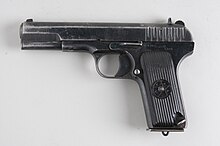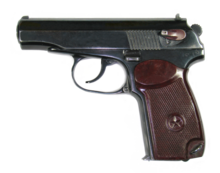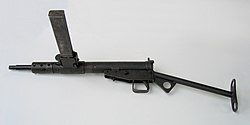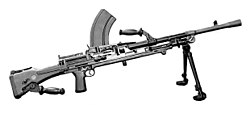List of military equipment used by the mujahideen during the Soviet–Afghan War
This article needs additional citations for verification. (July 2023) |
This list shows military equipment used by the mujahideen during the Soviet–Afghan War. The Mujahideen obtained weapons from many sources, mostly supplied by foreign sources, such as the Central Intelligence Agency’s Operation Cyclone, China, Egypt, Iran, Israel and the United Kingdom, and channeled through Pakistan. Many weapons were also captured from the Soviet Army or the Armed Forces of the Democratic Republic of Afghanistan.
Small arms
[edit]Heavy weapons
[edit]This includes anti-air and anti-tank weapons used by the Mujahideen, also artillery.
| Weapon | Image | Type | Origin | Notes |
|---|---|---|---|---|
| DShK[15] |  | Heavy machine gun | ||
| Type 54 HMG[24] |  | Heavy machine gun | ||
| SG-43 Goryunov[13] |  | Medium machine gun | ||
| KVP[10] |  | Heavy machine gun | ||
| ZU-23-2[25][26] |  | Anti-aircraft gun | Some mounted on trucks and armored vehicles. | |
| ZPU |  | Anti-aircraft gun | ZPU-1, ZPU-2 and ZPU-4 versions used. | |
| Oerlikon 20mm cannon |  | Anti-aircraft gun | 40 delivered in 1984.[27] | |
| RPG-2[15][28] |  | Rocket-propelled grenade | ||
| RPG-7[10] |  | Rocket-propelled grenade | ||
| RPG-18 |  | Disposable rocket launcher | Captured from Soviet forces | |
| RPG-22 |  | Disposable rocket launcher | Captured from Soviet forces[29] | |
| Type 69 RPG[30] |  | Rocket-propelled grenade | ||
| B-10 recoilless rifle | 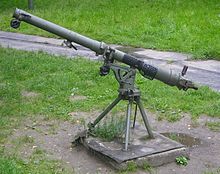 | 82mm recoilless rifle | Chinese Type 65 variant also used. | |
| SPG-9 |  | 73mm recoilless rifle | ||
| Type 56 |  | 75mm recoilless rifle | ||
| 82-BM-37 |  | 82mm mortar | Most widely used artillery piece[29] | |
| M1938[31] |  | 107mm mortar | ||
| Type 63 |  | 60mm mortar | ||
| M1942 (ZiS-3) |  | 76mm field gun | Captured from DRA forces[29] | |
| 2A18 (D-30) |  | 122mm howitzer | Captured from DRA forces[29] | |
| M1938 (M-30) |  | 122mm howitzer | Captured from DRA forces[29] | |
| Type 63 |  | 107mm multiple rocket launcher | About 500 launchers supplied.[32] | |
| Saqar |  | Multiple rocket launcher | Egyptian variant of BM-21 Grad. Delivered in several variants with varying range and caliber.[31] | |
| 9K32 Strela-2 (SA-7 Grail) |  | Man-portable air-defense system | Captured from DRA forces.[10] Egyptian Sakr-eye version also used.[citation needed] | |
| 9K34 Strela-3 (SA-14 Gremlin)[33] |  | Man-portable air-defense system | ||
| FIM-43 Redeye |  | Man-portable air-defense system | 50 launchers delivered.[32] | |
| FIM-92 Stinger |  | Man-portable air-defense system | 800 missiles delivered overall, deliveries began in 1986.[32] | |
| HN-5 | Man-portable air-defense system | HN-5A and HN-5B versions delivered, about 400 missiles supplied.[32] | ||
| Blowpipe |  | Man-portable air-defense system | 50 launchers and 300 missiles delivered.[32] | |
| BGM-71 TOW |  | Anti-tank guided missile | 80 launchers delivered in 1988[32] | |
| MILAN |  | Anti-tank guided missile | 160 launchers delivered in 1988[29] | |
| PMN mine |  | Anti-personnel mine | [34] | |
| M18 Claymore mine |  | Anti-personnel mine | [34] | |
| A.P. Mine No.5 | Anti-personnel mine | [34] | ||
| TS-50 mine |  | Anti-personnel mine | [34] | |
| TM-46 mine |  | Anti-tank mine | [34] | |
| M19 mine | 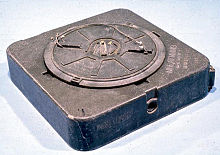 | Anti-tank mine | [34] | |
| A.T. Mine G.S. Mark V |  | Anti-tank mine | [34] | |
| Mk 7 mine | Anti-tank mine | [34] | ||
| TC-2.5 mine |  | Anti-tank mine | [34] | |
| TC-6.1 mine |  | Anti-tank mine | [34] | |
| PRB M3 mine | Anti-tank mine | [34] |
Vehicles
[edit]The Mujahideen acquired substantial amounts of armoured vehicles from the DRA, both captured during combat and brought over by defectors but the lack of trained personnel, spare parts and the prevalence of Soviet airpower meant that they were seldom used.[29]
| Weapon | Image | Type | Origin | Notes |
|---|---|---|---|---|
| T-55 |  | Main battle tank | Captured from the DRA, limited use[29] | |
| BMP-1 |  | Infantry fighting vehicle | Captured from the DRA, limited use[29] | |
| BTR-60 |  | Armoured personnel carrier | Captured from the DRA, limited use[29] | |
| BTR-152 |  | Armoured personnel carrier | Captured from the DRA, limited use[29] | |
| M113 |  | Armoured personnel carrier | ~5 given by United States[35] | |
| GAZ-66 |  | Transport truck | Captured from the DRA[36] | |
| ZIL-130[37] |  | Transport truck | ||
| Toyota Land Cruiser |  | Pickup truck | Bought in Pakistan[36] | |
| KrAZ-255[38] |  | Transport truck |
Gallery
[edit]- Jamiat-e-Islami Mujahideen manning a DShK.
- 9K32 Strela-2 missile.
- Hezb-i Islami Khalis fighters with a mix of AK-47 and Lee–Enfield rifles
- Captured field guns
- Mujahideen weaponry seized by the Soviets: rocket-propelled grenades, light machine guns, submachine guns, shotguns
References
[edit]- ^ Jalali, Ali Ahmad (1998). The Other Side of the Mountain: Mujahideen Tactics in the Soviet-Afghan War. p. 291.
Malek took his American G3 [bolt-action] rifle and his Soviet TT pistol and walked out of the depot cave.
- ^ a b c Thompson, Leroy (27 October 2022). Soviet Pistols: Tokarev, Makarov, Stechkin and others. Bloomsbury Publishing. p. 69. ISBN 978-1-4728-5349-3. Retrieved 8 July 2023.
- ^ a b c d Jalali, Ali Ahmad (1998). The Other Side of the Mountain: Mujahideen Tactics in the Soviet-Afghan War. p. 6.
The Soviet officer dropped his AK-74 and took out his pistol. Doctor Khayat threw a hand grenade at the officer and killed him. Then he crossed the road and took his AK-74 and his Makarov pistol.
- ^ a b Jalali, Ali Ahmad (1998). The Other Side of the Mountain: Mujahideen Tactics in the Soviet-Afghan War. p. 387.
We captured 16 Kalashnikovs and I got their commander's Makarov pistol.
- ^ Jalali, Ali Ahmad (1998). The Other Side of the Mountain: Mujahideen Tactics in the Soviet-Afghan War. p. 120.
Dr. Qudus group had one Soviet PPSH submachine gun, some bolt-action rifles and some other weapons.
- ^ Jalali, Ali Ahmad; Grau Lester (1989). Afghan Guerrilla Warfare, in the Words of the Mujahideen Fighters. MBI Publishing. p. 379. ISBN 0-7603-1322-9.
The HIH group were armed with AK-47 Kalashnikovs, while the Mohseni group had British Sten guns and other weapons.
- ^ McCurry, Steve (September 1979). "Steve McCurry and Commander Abdul Raluf". Archived from the original on February 11, 2014.
Abdul Raluf, standing to my left, was the commander of the Asmir Garrison in Afghanistan's Kunar province. In September 1979, Commander Raluf and his 300 soldiers at a strategic outpost on the border with Pakistan, switched sides, killing the provincial governor, stripping the garrison of weapons and supplies, and joined forces with the Mujahideen. It took another ten years for the Afghan government to fall.
- ^ Isby (1990), p. 7.
- ^ Urban 1987, p. 69.
- ^ a b c d e f g h i j k Isby, David (20 February 2013). Russia's War in Afghanistan. Bloomsbury Publishing. pp. 81−84. ISBN 978-1-4728-0179-1. Retrieved 25 July 2023.
- ^ Grau, Lester W. (1998). The bear went over the mountain – Soviet combat tactics in Afghanistan. Frank Cass. pp. 42. ISBN 0-7146-4413-7.
- ^ "Rifle - Chinese Type 56 Assault, circa 1960s". Archived from the original on May 19, 2023.
- ^ a b c Jalali, Ali Ahmad (1998). The Other Side of the Mountain: Mujahideen Tactics in the Soviet-Afghan War. p. 8.
The Soviets captured the weapons of the dead Mujahideen including some AK-47s, a Goryunov machine gun, an RPG-7 and a few AK-74s captured from the Soviets in the past.
- ^ "Use of the M-16 Rifle by Mujahideen during the Soviet-Afghan War 1979-1989". 5 March 2023.
- ^ a b c d e Roy, Olivier (1990). Islam and resistance in Afghanistan. Cambridge University Press. pp. 184–186. ISBN 0-521-39700-6.
- ^ Jalali, Ali Ahmad (1998). The Other Side of the Mountain: Mujahideen Tactics in the Soviet-Afghan War. p. 411.
The Model M1891/30 is a Russian/Soviet bolt-action rifle or carbine which fires the 7.62x54 cartridge…The Mujahideen called them five-shooters.
- ^ Jalali, Ali Ahmad (1998). The Other Side of the Mountain: Mujahideen Tactics in the Soviet-Afghan War. p. 409.
British-manufactured .303 bolt-action rifle which was the standard British infantry weapon from 1895 through the Korean War… It has a 10-round magazine and can carry an additional round in the chamber, so the Mujahideen called them 11-shooters.
- ^ Jalali, Ali Ahmad (1998). The Other Side of the Mountain: Mujahideen Tactics in the Soviet-Afghan War. p. 251.
We had Enfield and G3 bolt-action rifles and a few Kalashnikovs. We lacked the capability to launch major attacks, but conducted hit and run actions. We did not have a base in the mountains, but lived in the village.
- ^ Jalali, Ali Ahmad; Grau Lester (1989). Afghan Guerrilla Warfare, in the Words of the Mujahideen Fighters. MBI Publishing. pp. 253. ISBN 0-7603-1322-9.
We had one RPG-7 with three rounds, two Kalashnikovs, and some Marko Chinese bolt-action rifles. [Footnote:] Marko is the Chinese copy of the German M-88 Mauser.
- ^ Jalali, Ali Ahmad (1998). The Other Side of the Mountain: Mujahideen Tactics in the Soviet-Afghan War. p. 413.
Gas-operated semi-automatic Soviet carbine with a folding bayonet…The Mujahideen simply called them carbines.
- ^ Jalali, Ali Ahmad (1998). The Other Side of the Mountain: Mujahideen Tactics in the Soviet-Afghan War. p. 177.
My force was armed with individual automatic rifles (AK-47), light machine guns (RPK), heavy machine guns (PK), light anti-tank grenade launchers (RPG-7), Milan anti-tank missile launchers, 82mm recoilless rifles, 75mm recoilless rifles, 82mm mortars, 107mm Multiple Barrel (twelve barrel) rocket launchers (BM12), Saqar Rocket Launchers, and Stinger shoulder-fired air defense missiles.
- ^ Jalali, Ali Ahmad (1998). The Other Side of the Mountain: Mujahideen Tactics in the Soviet-Afghan War. p. 407.
Czechoslovak M26 light machine gun which fires from a top-loading 20-round magazine…The Mujahideen called them 20-shooters.
- ^ "Type 67 GPMG". Modern Firearms. 2010-11-10. Archived from the original on March 21, 2023. Retrieved 2022-01-18.
- ^ Urban 1987, p. 123.
- ^ "The Taliban acquisition of anti-aircraft platforms - FDD's Long War Journal". 2 November 2010. Archived from the original on September 27, 2022.
- ^ Jalali, Ali Ahmad; Grau Lester (1989). Afghan Guerrilla Warfare, in the Words of the Mujahideen Fighters. MBI Publishing. p. 135. ISBN 0-7603-1322-9.
Mujahideen armaments included one Saqar, one BM12, one 122mm howitzer, six 82mm mortars, eight 82mm recoilless rifles and approximately 40 RPG-7s. We also had some ZSU-23-2 antiaircraft guns and some Stinger antiaircraft missiles.
- ^ "Stinger missiles in Afghanistan". Archived from the original on March 31, 2022.
- ^ Grau, Lester W. (1996). The Bear Went Over the Mountain: Soviet Combat Tactics in Afghanistan. DIANE Publishing. p. 121. ISBN 978-0-7881-4665-7.
This force had 15 men armed with 2 RPG-2 antitank grenade launchers, a DShK heavy machine gun, a sniper rifle and several AKM assault rifles.
- ^ a b c d e f g h i j k Isby, David (1989). War in a distant country, Afghanistan: invasion and resistance. Arms and Armour Press. pp. 42. ISBN 0-85368-769-2.
- ^ Urban 1987, p. 126.
- ^ a b "The Other Side of the Mountain: Mujahideen Tactics in the Soviet-Afghan War". 1998. p. 412.
Egyptian 107mm or 122mm MRL. It has one, two, three and four-barrel light-weight launchers. The 107mm (Saqar 20) has a maximum range of 8000 meters and the 122mm (Saqar 30) has a maximum range of 10,800 meters. The 107mm model was more common in Afghanistan. Some Mujahideen state that they had special rounds which enabled the Saqar to reach 20 kilometers and the Saqar 30 to reach 30 kilometers. Saqar means "eagle" in Egyptian
- ^ a b c d e f "Trade Registers". armstrade.sipri.org.
- ^ Afghanistan, 1979-2001; Part 2
- ^ a b c d e f g h i j k shtab, Russia (Federation) Generalʹnyĭ (2002). The Soviet-Afghan War: How a Superpower Fought and Lost. University Press of Kansas. p. 243. ISBN 978-0-7006-1185-0. Retrieved 23 July 2023.
- ^ "AFGHANISTAN: MUJAHIDEEN DEMONSTRATE CAPTURED SOVIET ARMY VEHICLE AND PRISONERS". British Pathe. (1982).
- ^ a b Urban 1987, p. 96.
- ^ Grau, Lester W. (1998). The bear went over the mountain - Soviet combat tactics in Afghanistan. Frank Cass. pp. 169. ISBN 0-7146-4413-7.
- ^ "Kraz 255B : where has it been used". Armorama.
- Urban, Mark L. (18 December 1987). War in Afghanistan. Springer. ISBN 978-1-349-18975-5. Retrieved 29 July 2023.
- Isby, David C. (1990). The War in Afghanistan 1979-1989: The Soviet Empire at High Tide. Concord Publications. ISBN 978-9623610094.


 French
French Deutsch
Deutsch

